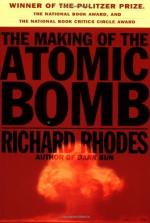|
This section contains 1,445 words (approx. 4 pages at 400 words per page) |

|
Chapter 11 "Cross Sections" Summary
Before the war begins, Otto Frisch (in Hamburg, Germany) would run experiments by day and think about physics into the night. He feels war coming in 1939 and is depressed. In Copenhagen, his aunt Lise Meitner, worries about her isolation in Stockholm, and Frisch worries about his vulnerability. Mark Oliphant, who directs the physics department at the University of Birmingham, hires him as auxiliary lecturer. In the safety of Britain he thinks about physics again and is intrigued by fission. He considers Bohr's theoretical work as the German's invade Poland. Two staff physicists are developing the cavity magnetron, an electron tube that can generate intense microwave radiation for ground and airborne radar. It's the most valuable English innovation in the war. Russia invades Finland.
Frisch reviews his research into four possible mechanisms for an explosive chain reaction in...
(read more from the Chapter 11 "Cross Sections" Summary)
|
This section contains 1,445 words (approx. 4 pages at 400 words per page) |

|




